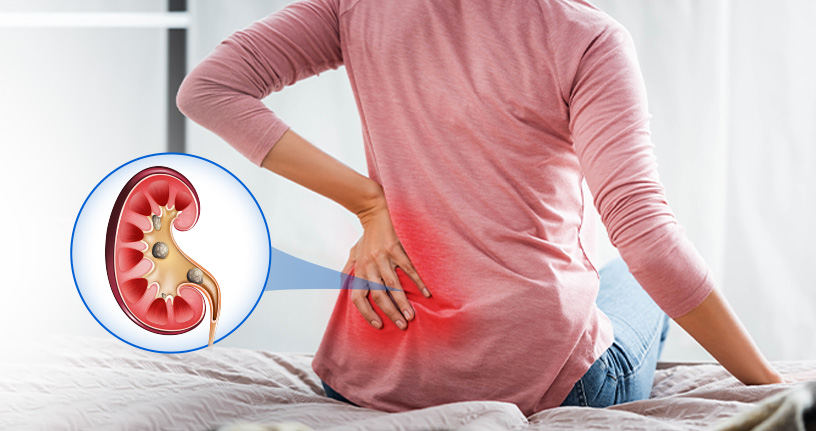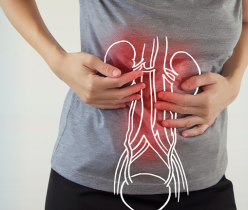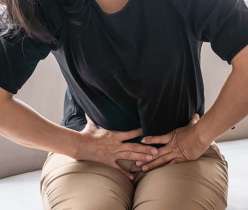Kidneys work to keep our bodies in balance. Its functions are to remove the following:
-
-
- Toxins, waste, and excess water from the bloodstream through urine.
-
Additionally, kidneys make hormones to produce red blood cells that become an active form of vitamin D.
Solid crystals from the salt in urine are referred to as kidney stones; kidney stones usually block the urine flow and cause infection, kidney damage and kidney failure in certain cases. The stone size and location can vary in patients. The stone either travels out of the body through the urinary tract or stays in the kidney, urethra or bladder. About one in 10 men and one in 30 women have the risk of kidney stones. If you have had a kidney stone, you have an increased chance of getting a second stone. 30 to 50% of people get a second stone within 5 years, and after that, the risk declines; however, in some cases, people keep getting stones their whole life.
Kidney stones causes
The hardened minerals in the kidney or urinary system create an ideal environment for the kidneys to form a stone. In most cases, the kidney forms stones because of an increase in the minerals that form stones in the urine or a decrease in urine volume.
Sometimes usage of oral medications (for conditions such as cancer, HIV or kidney disease) also increases the risk of developing kidney stones.
Untreated kidney stones can cause blood in the urine, severe pain, UTIs (urinary tract infections), kidney infection and loss of kidney function.
Signs of kidney stones
Not all patients get the same symptoms of their kidney stone; many experiences no signs or symptoms, whereas some experience symptoms such as gripping back pain, cloudy or bad smelling urine, blood in urine, feeling of shivering or sweating, urgent feeling of urinating, small stone passing from urine because of uric acid.
Types of kidney stones
The types of kidney stones include:
-
-
- Calcium - In common cases, kidney stones are formed when other minerals like oxalate or phosphate combine with calcium.
- Struvite – This type of stone is caused by UTIs and can be quite large
- Uric Acid - Uric acid stones are often triggered when someone eats or consumes large amounts of protein foods. The type of uric acid stone is often found to be softer than other stones. The access intake of fish, shellfish, and meat products, especially organ meat, may increase uric acid in urine.
- Cystine stones – It is a rare inherited condition where the protein cysteine can build up in urine and form stones.
-
Also Read – Chronic Kidney Disease Symptoms and Causes
Kidney stones treatment
Small stones usually cause no problems. In most cases, kidney stones are treated without surgery. Most stones pass by themselves within three to six weeks. For kidney stone pain relief, the only treatment is to take medication. In chronic conditions, hospital admission may be needed, with strong pain-relieving medication if the pain worsens or you experience bleeding or urine blockage.
Preventions of Kideny stones
Prevention through lifestyle changes, especially eating and exercise habits can help people avoid kidney stones.
-
-
- Drinking around 2 to 3 quarts or 2 to 3 litres of water daily is commonly recommended for someone with a history of kidney stones (unless on a fluid-restricted diet).
- A low-protein diet can help reduce the chances of developing some types of kidney stones.
- Besides dietary changes or adjustments, your doctor can guide or prescribe the best medications that help control the amounts of certain minerals from developing in the urine.
- Some people experience calcium kidney stones; this happens because of the excessive production of hormones by the parathyroid glands. Removing one or more of these glands through surgery can stop kidney stones from forming.
- Identify the kidney stone symptoms and visit a doctor to seek his advice. Also, discuss with him how to prevent kidney stones from returning and how to keep your kidneys healthy.
-




